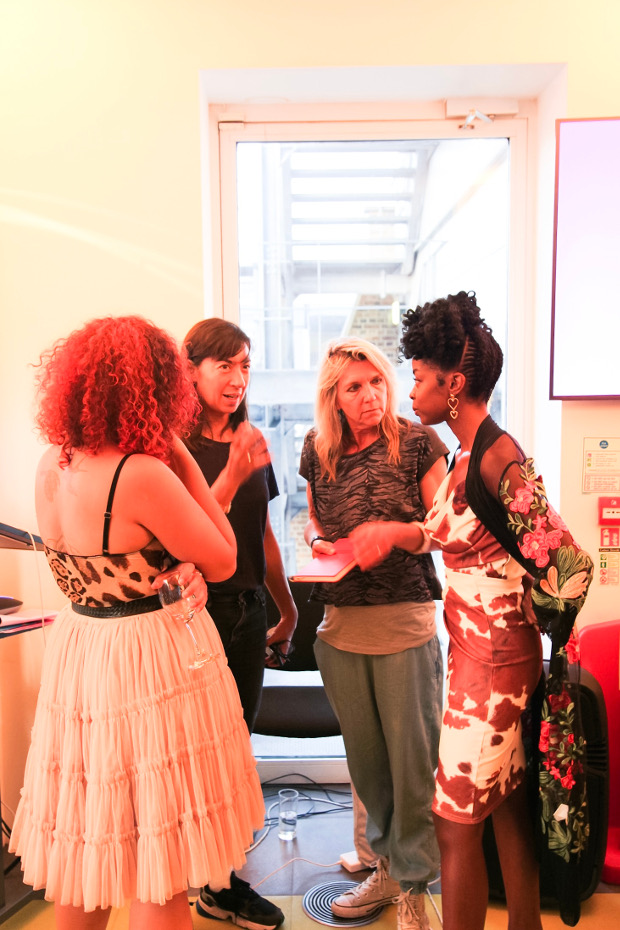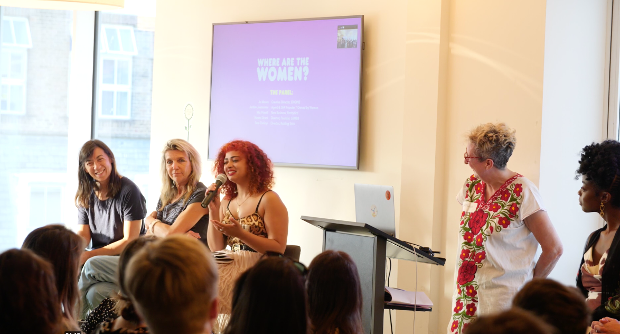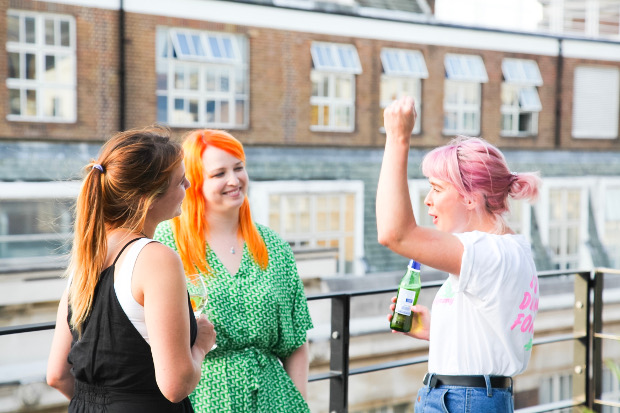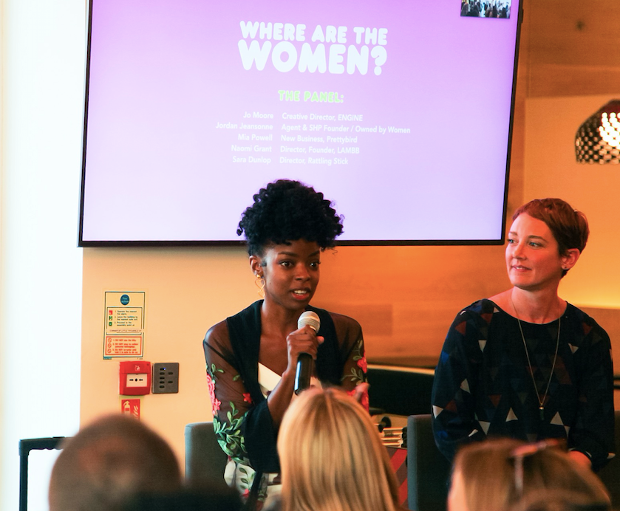
Where Are the Women Directors?

Last week at ENGINE we hosted heat three of the Shiny Awards, where we showcased films from emerging, talented directors followed by a debate.
Our panel, including multi-award-winning director Sara Dunlop, ENGINE’s creative director Jo Moore, Mia Powell from leading production company Prettybird, director and creative Vanessa Onalo from agency Fifth and Jordan Jeansonne, a filmmakers agent from SHP and founder member of Owned by Women, set to tackle the thorny question: ‘Where are the women directors in the advertising film industry?’
According to recent figures, less than 7% of commercial directors are women and ‘white, male’ still dominates the talent pool. So why are female directors still finding it challenging to break through and what practical solutions can the industry do to support more women in this important creative role?
From my personal experience I have some thoughts about where some issues might lie. Starting out at film school with ambitions of being a director myself, I was gently pushed further and further towards a production role, rather than aspiring to be a director, with people of influence advising me it would be an easier career path as a woman. Worse still, when doing work experience on a TV drama I expressed an interest in going on to working within the camera department, I was told that I would find it difficult as I wouldn’t be strong enough to hold the heavy cameras!
Having worked as a producer for many years now I wouldn’t change my job for the world, however, it is consistently evident to me when searching for directors to put forward for commercial productions that there is still an obvious imbalance in the number of women directors compared to male directors.
Fantastic initiatives in recent years, such as Free The Bid, have advocated for female directors and highlighted the imbalance in opportunities open to women. Free The Bid asks advertising agencies and brands to pledge to put one female director forward to bid on every commercial project, allowing them equal opportunity to be considered for the role of director. And I am delighted that ENGINE is taking steps to become more involved in this initiative.
However, there are many different issues at play which affect female directors, even getting to the point of being able to bid on projects, let alone be awarded the job is a struggle. So we opened up a discussion to find out what challenges female directors are facing and what can be done to even out the playing field.

Focus on education
It seems that the very start of a female director’s career is where the biggest fall out occurs. The industry landscape can be barren and hostile for a woman starting out in a creative role. The ambition is there; most of the girls on my production degree course wanted to be directors but the numbers started to drop off after we entered the working world. As well as being discouraged from pursuing a directing career myself, I have heard many similar stories from other women in production.
It’s clear there needs to be more intervention at an educational level to encourage and support girls to pursue creative roles and careers and make sure they are supported in their quest when transitioning into the working environment. Advertising agencies and production companies could make a big difference by building better connections with film schools in the UK in order to connect with ambitious female directors at the very beginning of their career. Nurturing female talent from the start could reduce the fall out and eventually inject a pleather of new, refreshing talent into the industry.

Access to professional mentorship
It’s tough starting out as a director, male or female. You have to be confident and determined. You need to find your creative voice. You have to put in a lot of time and often your own money into building up a reel that will enable you to even be considered for paid commercial projects. Female directors often can’t compete with male directors as more opportunities for men means their reels are stronger. For women to overcome years of gender bias on top of this, it’s no wonder women choose to pursue other career options.
Mentorship in the early stages of a female director’s career could be a vital lifeline. Guidance and support from an established industry professional, who can advise on the best career path and also open their black books to valuable contacts and opportunities, could give new directors an essential step up in their career.
Emerging female directors would also benefit from more access to funding to enable them to make more of their own films, develop their skills as a director and in turn strengthen their reels. Both mentorship and funding would go a long way in helping clear the pathway for women and enable them to reach an even playing field to pitch for jobs, alongside men.

Don’t pigeonhole women
However, it’s not just becoming a female director that’s hard. Another challenge that women face when pursuing a directing career is that they are often pigeonholed in only being given the opportunity to work on projects that promote female-related or kids products. This dangerous cliché is extremely limiting and further narrows the window of opportunity for women. Why is this still happening?
Banish bias
Only 12% https://www.theguardian.com/media/2019/apr/14/sexism-in-advertising-industry-gender-pay-gap-diversity of creative directors in advertising agencies are women. This logically suggests that many commercial scripts are written by male creatives, and the directors chosen to pitch on a production project are chosen by the creatives. In an industry seemingly dominated by men, could there be an unconscious gender bias at play here? This is where the Free the Bid initiative becomes key, creating the opportunity for women to be considered for the full spectrum of briefs is vital to supporting gender parity among directors.
Producers and production companies also play a crucial role. They are usually the ones who put together the shortlist of directors for creatives to review and consider for a project. Making a stand and taking on the responsibility to include more female directors in the mix would make a big difference to giving more opportunity to women. Taking the time to discover new female director talent, building a female director database, and taking the opportunity to showcase new female talent to creatives whenever possible.
The production company Prettybird takes gender equality very seriously and has committed to 50:50 gender split crews. This is highly commendable and a fine example of how a company can make a positive change in the industry. Getting more women on set, even in the role of a runner, helps women to learn and develop their creative skills in an active production environment, to network with others and build their career. I hope this acts as an example to other production teams who could easily do the same, it just takes a bit of work and commitment, but the payoff could have a huge impact.

Men need to play a key role
We undoubtedly need men’s support in balancing the scales. We need everyone to make a stand with us to open up the creative landscape and allow fresh, diverse voices to be heard. This doesn’t just apply to gender equality but to people of colour, members of the LGBTQI community, and all populations under-represented in the media. It can only serve to help make brands more creative, relevant, relatable and accessible to the customers they aim to connect with.
It's important we keep the conversation going, but it’s also important to act. It’s clear that there are multiple issues at play which are still affecting the gender balance amongst directors. The only way to make a change is for people within the industry to take action, at every level and in whatever role they have influence in, from nurturing new talent to opening up new opportunities and making sure women get a chance to bid for the work. Together, we got this.










